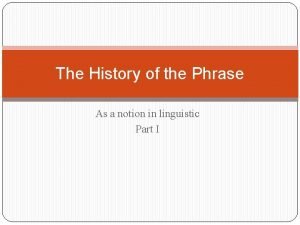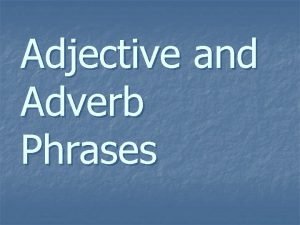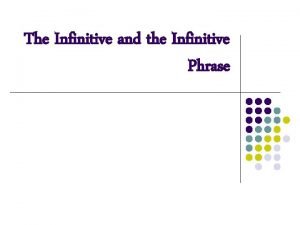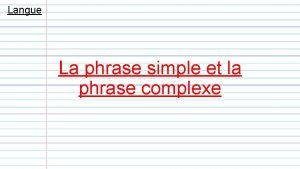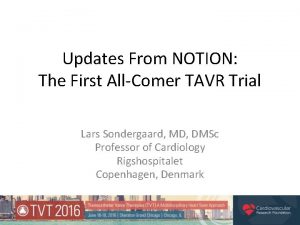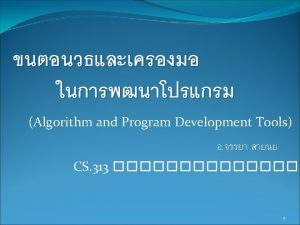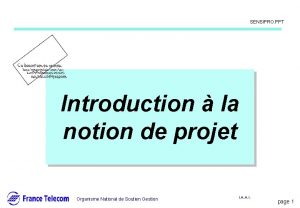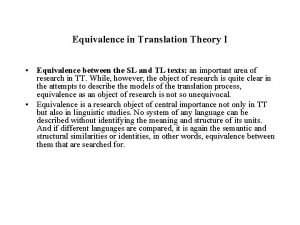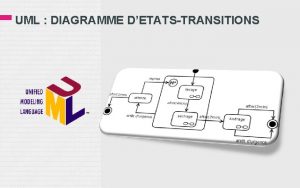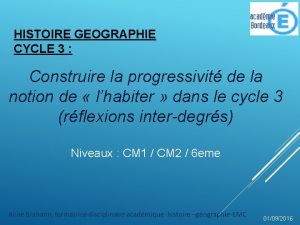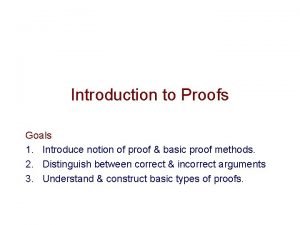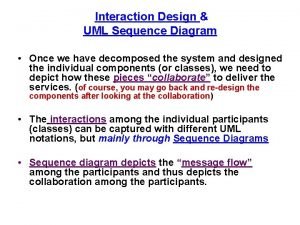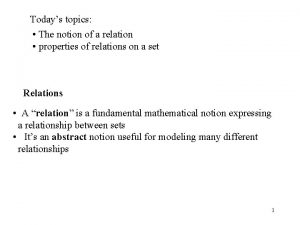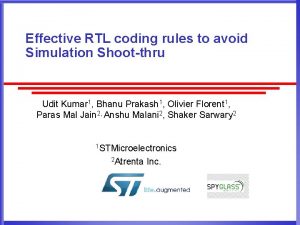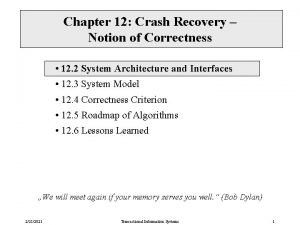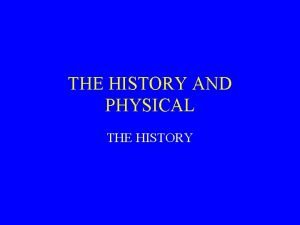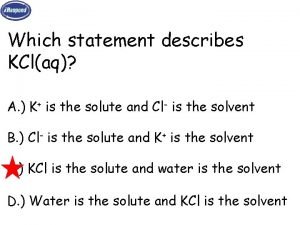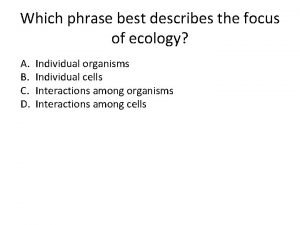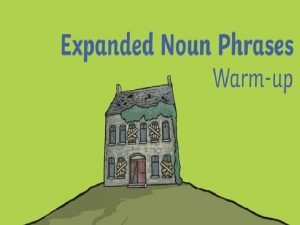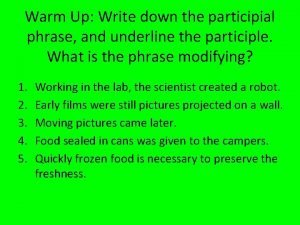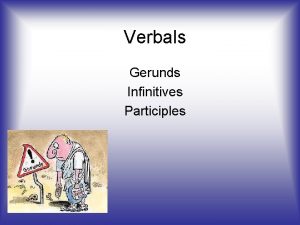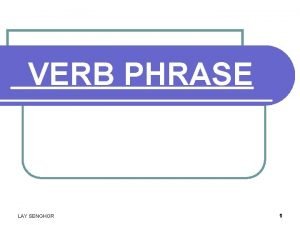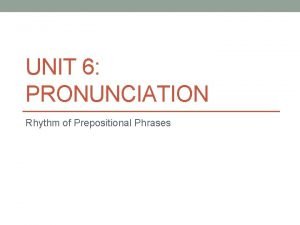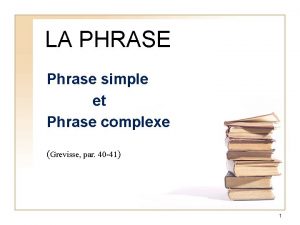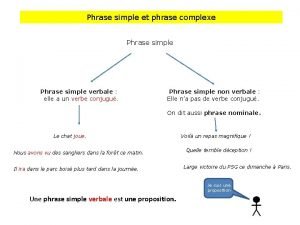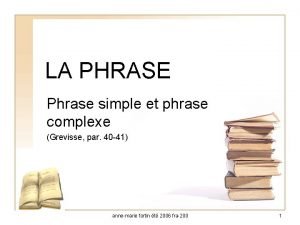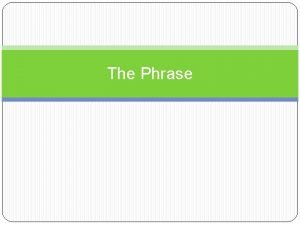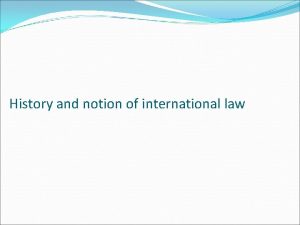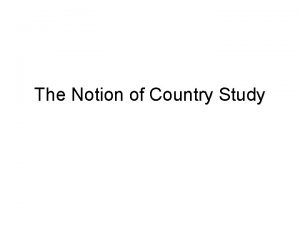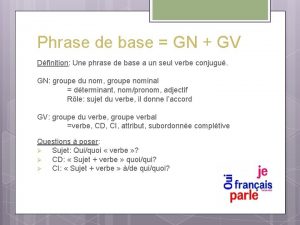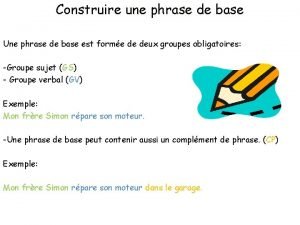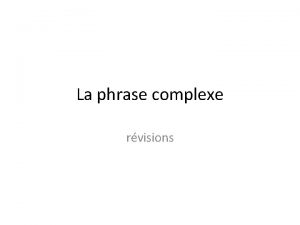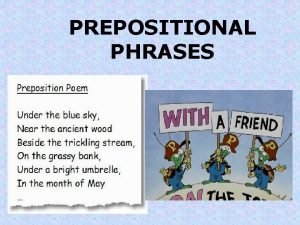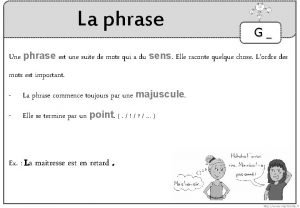The History of the Phrase As a notion
























































































- Slides: 88

The History of the Phrase As a notion in linguistic Part I

The Phrase Today phrases are an essential and undeniable truth Hornstein, Nunes and Grohmann: F 4: Words are composed into units with hierarchical structure i. e. phrases. Given this, they should have been discovered a long time ago So when did linguists start referring to phrases?

Brief Overview of the History of Linguistics The history of linguistic investigation goes back more than 2500 years: Before 600 BCE Indian linguistics only ‘discovered’ in Europe many centuries later Socrates (469 -399 BCE), one of the first to write on Greek linguistics only through secondary sources (e. g. Plato 428 -348) Study of Latin, Arabic and Hebrew after Greek Other European languages only in late Middle Ages

Indian Linguistics Started as a way of preserving an understanding and correct pronunciation of Vedic Sanskrit Changed over the centuries (as languages do) Was the language of the scriptures and of religious rituals Wanted to maintaine an understanding and correct pronunciation of Vedic for religious purposes So they started to write grammars

Panini One of the most important of the Indian Linguists Not because he was one of the earliest His grammar was written sometime between 500 and 300 BCE But because it is the most extensive Contains nearly 4000 rules And because of it’s remarkable advanced nature It contained notions not found in western linguistics until the 20 th century The phoneme Null phonemes Formal rules Rule ordering

The Nature of Sanskrit was a highly inflecting language A lot of Case and agreement morphology Word order was much freer than in languages like English Raamah pustakam pathati Ram books reads Raamah pathati pustakam Pustakam Raamah pathati Pustakam pathati Raamah Pathati Raamah pustakam Pathati pustakam Raamah

What did Panini say? Not surprising that most of the grammar is about phonology and morphology Had very little to say about syntax

Phrase Structure Rules? According to Kiparsky Panini’s grammar contained rules like: A AA /C _ D ‘A’ becomes ‘AA’ in the context of a preceding ‘C’ and a following ‘D’ This looks very similar to a phrase structure rule: S NP VP ‘S’ is made up of an ‘NP’ followed by a ‘VP’ But This is not Panini’s representation of this rule – it’s Kiparsky’s It isn’t a phrase structure rule, but a morphological one It is a reduplication rule A is reduplicated (AA) in a certain context

Why Panini didn’t discover the phrase Although very advanced, it understandably concentrated on the most obvious aspects Morphology – because there are many forms of many words Phonlogy – because the written system had a phonetic base (unlike Chinese) Because of the free word order, syntax was not so obvious Because Indian grammarians studied no other languages didn’t compare Sanskrit to other systems and so couldn’t notice patterns in syntactic phenomena

Greek Ancient Greek was a written language over 1400 BCE Mycenaeans - Linear B Based on the Minoan syllabic system Wasn’t ideal for Greek and we still can’t work out how this early version of Greek sounded The first written system was forgotten until about 900 BCE Then a new written system was developed Based on Phoenician script Phonetic representation – more suited to Greek pronunciation Developed over the years Now is the basis of most European written systems We can therefore assume that the Greeks were interested in their language (at least phonetic aspects of it) from about this time

Greek Language Philosophers Socrates (469 -399 BCE) No written records of anything that Socrates said We have the reports of other Greek philosophers (e. g. Plato) Unclear whether these accurately portray Socrates' ideas or whether they portray Plato’s ideas Plato (428 -348) also had things of his own to say about language Aristotle (384 – 322 BCE) furthered these ideas The Stoics (310 – 50 BCE) probably gave the most thorough treatment

What the Greeks had to say Greek linguistics was bound up in Greek philosophy Mathematics; Physics; Astronomy; Biology; Ethics; Logic (study of ‘valid arguments’); Rhetoric (the study of persuasive speaking); Epistemology (the study of understanding) E. g. whether words derive in nature or are man made? the nature of objects themselves are the origin of words man gave names to objects randomly Obviously these sorts of questions are not likely to reveal much about syntactic structure

Specific Greek Ideas on Language Phonetics, but only to the extent that it involved the written system No written system is purely phonetic and so what they had to say on the subject was not particularly interesting Semantics, but more as a part of logic Distinguished subject and predicate from a semantic point of view, but didn’t realise that this had any realisation in the sentence Plato was first to split sentence into two major elements: onoma (noun) subject rhema (verb) predicate Words, not phrases identified morphologically They were interested in words and their ontology led to questions of categories

Specific Greek Ideas on Language They were interested in sentences and their functions declaratives, interrogatives, imperatives Not so much in their forms They were interested in morphology created paradigms of all the different forms of types of word And terms for these forms

The Nature of Greek It is not surprising that the Greeks were not so interested in syntax Greek, like Sanskrit, was highly inflectional and had free word order The obvious aspects of the language were morphological and not syntactic Studied just one language (Greek) Their philosophical interests lead them in a different direction

On Subordination Plato identified two basic elements (words) of the sentence Greeks also knew other words were subordinate to these Is this the beginning of the phrase? Today subordination = something is part of something Greek notion more like ranks in the Army Captains are subordinate to Generals Doesn’t mean that captains are part of generals Hierarchy – but not constituent structure

Dependency X is subordinate to Y = X depends on Y Dependency marked morphologically (i. e. By agreement) Not semantically – meaning was the domain of logic, not linguistics Free word order meant that there was no compulsion to see this relationship in terms of phrase structure

Latin The Romans impressed by Greek intellectualism encouraged the Greeks to continue their studies Study of Latin very much influence by Greek linguistics Most attempted to make what the Greeks said fit Latin similar to Greek But not the same as Greek categories and terms did not fit perfectly This dependency on Greek linguistics meant that the Romans did not produce much innovation

Priscian (500 CE): one of the most influential grammars of Latin basis of the study of Latin even after the fall of the empire Almost entirely based on Thrax’s (170 – 90 BCE) Greek grammar Thrax’s grammar did not even mention syntax Priscian had 2 volumes on it Nothing of interest in these chapters contained rather dubious philosophical arguments o Latin is basically S V because existence precedes actions He did mention the notion of a subordinate clause But again, the use of subordination was that of the Greeks rather than the modern linguistic one

The Middle Ages The middle ages starts with the fall of the Roman Empire and ends with the start of the Renaissance From a linguistic point of view we can split it into two parts Scholasticism Not particularly interesting – mostly based on Priscian grammar Speculative Grammar More innovative – the start of the study of other languages

Scolasticism The main idea to bring all knowledge under one (Christian) framework It strongly rejected ‘pagan’ Greek learning Latin became a lingua franca Most linguistic work = producing Lain grammars for teaching Ironically this maintained Greek influence based on Priscian grammar, which itself was based on Thrax

Speculative Grammar Interests in other languages than Latin started to gather strength Through influence of Arabic linguistics from Moors in Spain (influenced by Aristotelian ideas) Through influence of Hebrew linguistics from Biblical studies Perhaps because of this, more emphasis was put on syntax Speculative grammarians first to unify syntactic and semantic notions of subject and predicate

Thomas of Erfurt (1310) Socrates albus currit benne Socrates white runs well “white Socrates runs well” ‘albus’ is dependent on ‘Socrates’ and ‘benne’ is dependent on ‘currit’ Does this mean subject made up of ‘Socrates albus’ and a predicate made up of ‘currit benne’? i. e. phrase structure analysis? But he took the meaning of dependency to be the traditional one “one part of a construction stands to another either as depending on it or satisfying its dependency”

Thomas of Erfurt (1310) Also took Greek idea that dependency is based on morphology verb agrees with subject, so verb is dependent on subject Therefore the subject is the main element of the sentence Socrates albus currit benne Very different analysis to modern phrase structure based one There is no evidence here of the notion of a phrase

The Renaissance (starting 14 th C) The Renaissance was both forward and backward looking Revived interest in classical studies (Greek) Rejected current wisdom Rise of the idea of nation more emphasis placed on national languages and less on the lingua franca Surprisingly not much innovative thinking from a linguistic point of view Most attempted to force the analysis of national languages into the framework of Priscian who had already tried to force the analysis of Latin into the framework of Thrax!

Port Royal Grammarians One group of Renaissance linguists did have some interesting ideas about syntax Connect syntax to meaning unfortunately rather than the traditional (Greek) view that morphology was its basis the start of the ‘notional definition’ of categories (a noun is a name, etc. ) More interestingly, developed a new view of subordination Subordination is a superficial representation of independent constructs: The invisible God created the visible world God is invisible. God created the world. The world is visible. This view necessarily precludes the idea of phrases the complex sentence is not made up of connected elements, but of independent simple ideas.

Comparative Linguistics During the Renaissance more languages than ever before came to be studied But not much thought about possible connections between languages Assumed system devised by the Greeks was applicable to other languages, it was Not assumed that other languages had developed from Greek There had been several theories, from Biblical sources, that held that European languages all descended from a single parent language

Scythian Hypothesis According to the Bible, God made everyone speak different languages after the tower of Babel incident But, then the flood killed everyone, except for Noah and his family Legend has it that Noah’s son, Japheth, was the father of Europe he spoke a language from which all European languages have descended This language, apparently, was called Scythian (Goropoius 1569) Scythian died out a long time ago

Confirming the Scythian Hypothesis Once enough attention had been turned to European languages, it started to be noted that there were similarities between them Furthermore, regularities in the differences between languages could be noted These mainly concerned the forms of words: Latin pisces pede pater pinna pugnam English foot father feather fight So it seemed that the Scythian Hypothesis could be correct. Throughout the 17 th century it gained popularity

Indian linguistics comes to Europe The Indian linguistic tradition had been known about in Europe since the 1500 s Walter (1733) added Sanskrit to Scythian family real interest in the Indian tradition started Comparative Linguistics virtually swept all other linguistic interests away The notion of the Indo European language family really took off On a scientific basis more than a religious one It had been thought that Hungarian was not an Indo European language since the early 18 th Century, 1770 Sajnovics - Hungarian and Lapp are related and 1799 Gyármathi - Hungarian and Finnish are from the same family

Neogrammarians Towards the end of the 1800 s a group of particularly aggressive young linguists in Germany dominated linguistics They criticised previous comparative linguistics for being too wishy-washy Believed that sound laws should be inviolable laws that govern how languages change over time and hence can be related to common ancestors if there were exceptions to these laws, they cannot have been stated right

Why Comparative Linguistics did not discover the phrase The main focus of the comparativists was on the lexicon easy to collect and compare vocabularies of languages to discover similarities and patterns in differences not easy to do the same with syntactic phenomena Some languages have free word order, others have more fixed orders Some languages have basic SVO organisation, others VSO or SOV These things don’t seem to have much of a connection Therefore, not much attention was paid to syntactic phenomena, no surprise that no new discoveries were made in the area for the nearly 200 years that comparative linguistics dominated the study of language

European Structuralists The dominance of comparative linguistics was finally broken Ferdinand de Saussure’s ‘A course in general linguistics’ published 1916 three year after his death This ushered in a period known as Structuralism A hopeful title, from our perspective

What Structuralists Believe The elements that make up a language form a system which can only be understood in terms of each other The elements are signs An arbitrary link between form and meaning The meaning of the signs is dependent on the meaning of other signs in the system The 8. 25 to Paris

Did the Structuralists discover phrase structure? Unfortunately not Like the comparativists, the structuralists were concerned more with words Their pronunciation (the Prague school) Their meaning Saussure had virtually nothing to say about syntax as we conceive of it today

Conclusion From the beginnings of the study of language Prior to 600 BCE To the Structuralist period in Europe Until after the 2 nd World War No one came up with the notion of a phrase Reasons The languages which were studied initially did not make syntactic discoveries easy The later study of other languages were concerned with applying old ideas to new situations, rather than being innovative The interests of the times (philosophical issues, language families, languages as systems) were more easily satisfied through looking at words

The History of the Phrase As a notion in linguistics Part II

Linguistics in the USA before 19 th C Specifically American linguistics is a relatively new thing Previously American linguists were doing European linguistics (especially Indo-European based Comparative linguistics) America has a wealth of its own languages (Amerindian) But until the late 1800 s there was little intellectual interest in these cultures Americans were interested in expanding their own European based culture and the native populations were a hindrance The European attitude towards native peoples of the Americas had been one of cultural imperialism from the start So linguistic efforts were always geared to teaching the natives

Boas: the father of American linguistics Franz Boas (1858 -1942) was a German anthropologist He started as a physicist and geographer became deeply interested in Amerindian culture on an expedition to Canada Moved to America in 1887 He saw the study of Amerindian cultures and languages as urgent as they were fast disappearing many had already died out Devised ‘field methods’ to train linguistic students so they could rapidly form grammatical descriptions without having to learn the language

Discovery Procedures Boas’ discovery procedures were a set of tools linguists could apply to discover the grammar of a language The best known of these are based on the notion of distribution The minimal pair test If two sounds appearing in the same context produce different words then they are distinct sounds (= phonemes) [khæt] – [phæt] [kh] and [ph] are distinctive [phæt] – *[pæt] [ph] and [p] are not In cases where sounds are in complementary distribution, they are non-distinctive [spæt] – *[sphæt] This is different to the case where a sound is not part of a language *[Xæt], *[s. Xæt],

Boas’ Philosophical Assumptions Boas was a believer in cultural relativity Against the idea that cultures pass through stages of development with Western culture as the highest Cultures cannot be evaluated against one another as higher or lower Cultures develop their own ideas from which they view the world and thus cannot be compared on any external measure To understand a culture you need to study it from its own position

Linguistic Relativity Humboldt (1767 -1835) Inner form of a language Languages don’t necessarily differ in the concepts they can express They differ in how they combine concepts in order to view the world Boas combined Humboldt’s inner form with cultural relativity in ‘linguistic relativity’ The belief that we cannot make generalisations about a language based on what we learn of another language Goes against European linguistic tradition since the Greeks Linguists must study a language in its own terms Hence discovery procedures Implies that languages can vary without limit Supported by the fact that Amerindian languages seemed very different from European langauges

Boas Reprieve Linguistic Relativity Languages can only be studied in their own terms Discovery Procedures There are methods we can apply to discover the units that languages make use of However, Boas did not discover the phrase

Bloomfield Leonard Bloomfield (1988 -1949) was the founder of American Structuralism But he wasn’t always a structuralist He trained in Germany under the Neogrammarians He became very impressed by the Wilhelm Wundt (1832 -1920) Wundt is said to be the father of experimental psychology His aim was to make psychology scientific He used introspection Bloomfield wanted to make Linguistics more scientific

Bloomfield and Boas Bloomfield was also influenced by Boas Particularly in terms of linguistic relativity and the use of discovery procedures

Bloomfield 1914 His influences from Boas and Wundt were brought together in his short book An Introduction to the Study of Language (1914) This became a popular course book for linguistics in America It contained chapters on all aspects of linguistics, including syntax It contained the word ‘phrase’ twice Both times referring to what we would call an idiom Clearly at this time he did not know about phrases

Bloomfield and Structuralism In the 1910 s, Wundt became heavily criticised for his methods Introspection was not really scientific Bloomfield needed something else to base his linguistic science on In 1923 he published a seemingly positive review of Saussure’s work This book still had no mention of the phrase But even then, it was apparent that he had replaced Wundt with Behaviourism

Behaviourism Behaviourist Psychology took an extreme empiricist stance To account for human behaviour all one needed was to directly connect The environment (stimuli) The subsequent behaviour (response) There is no need to refer to unobservable things like ‘mind’ Behaviourism in Linguistics is a bit tricky There is plenty of stuff that we cannot directly observe Bloomfield thought it was possible If every abstract level was ultimately based on what is observable – sound Phonetics phonology morphology syntax

Bloomfield’s Linguistics In 1933 Bloomfield rewrote his earlier textbook in a much enlarged version Language In this book the chapter on Syntax concerns itself with constituent structure The term phrase is used to mean a constituent Therefore we know that the notion of the phrase was introduced at some point between 1914 and 1933, probably in the 1920 s The origins are a combination of: Bloomfield’s empiricism His application of discovery procedures Phone phoneme morpheme word phrase sentence

Bloomfield on Phrases The chapter on syntax is not very long It is rather superficial Containing a few not very detailed examples Poor John And no attempt at representation Some discussion of the notion ‘head’ of phrase Head is defined distributionally A head is a word which has the same distribution as the phrase Endocentric phrases have heads Poor John Exocentric phrases don’t have heads In the park; if John ran away But the man doesn’t have a head by this definition the man has the same distribution as poor John, so they are of the same category So the head does not determine the category of the phrase – unlike current view

Open, closed and partially closed phrases An open phrase is something that can be added to and still be the same type of phrase: students – interesting students – these interesting students A closed phrase cannot be added to without changing into another phrase these interesting students – * polite these interesting students – saw these interesting students A partially closed phrase can be added to, but not by everything that could be added to an open phrase black dogs – big black dogs – the big black dogs big dogs – * black big dogs This is not very illuminating Just gives names to phenomena without explaining it

Neo-Bloomfieldians After Bloomfield’s death (1949) his students carried on his work Zellig Harris (1909 -1992), Charles Hockett (1916 -2000) Hockett gave more detail to the Immediate Constituent Analysis Harris formalised the system to a greater extent

Hockett’s A Course in Modern Linguistics (1958) contains 3 detailed chapters on the Immediate Constituent (IC) analysis It is interesting to go into detail about these ideas as they show that Hockett’s view of the phrase is not the same as today’s Like Bloomfield, he used distributional devices to define syntactic notions such as ‘head’ With the same problems He did try to represent structure Though he said this was not important in itself – just useful for linguists

Chinese Box representation Hockett represented structure like this This representation allows things that is not allowed in current phrase structure diagrams (trees) Disappearance of elements Markers – add no meaning Discontinuous Constituents split by material which is not part of them

The Start of Modern Phrases Chomsky (1928 - ) was a student of Harris during the 1950 s 1957 Syntactic Structures A small book for computer science students Contained his own version of the Structuralist IC analysis Phrase Structure Grammar This was a ‘straw man’ Designed to show what Chomsky thought was wrong with the IC analysis

Phrase Structure Grammar Made up of rewrite rules, e. g. S NP VP VP V NP These produce phrase structures, represenatable as a tree This is now how we conceive of a phrase Phrases have positions inside other structures Phrases have structures of their own

How do phrases differ from ICs It is impossible to have discontinuous constituents in a phrase structure grammar Rewrite rules concern mothers, daughters and sisters S NP VP S is the mother of NP and VP are daughters of S NP and VP are sisters Mothers and daughters stand in a dominance relation Sisters stand in a precedence relation

Discontinuous constituents and crossing branches A structure with discontinuous constituents must contain crossing branches This involves a precedence relation between Aux and NP These are not sisters NP is the great aunt of Aux Phrase structure rules do not refer to grandmothers, aunts, great aunts, etc. and so cannot produce these structures

Why is there a difference? The structuralists did not adopt a restrictive theory of phrases The Chinese box representation placed very few limitations on what could be represented Even if there were things that were difficult to represent, this would not have mattered Representations were not important – only tools for the convenience of the linguist Chomsky’s PSGs are restrictive theories of phrase structure There are clearly things that they cannot do (restricted) The representations come directly from theory (rules) and so are important for making the restrictions obvious

Was Chomsky right to criticise ICs? PSGs were a straw man – meant to be knocked down PSG and IC analysis were clearly not exactly the same But the structuralists had no theory So they were immune from criticism But at the same time, they made no real claims In order to see the problems with the IC analysis, Chomsky was forced to invent theory One of his points was that the lack of formal theories of language is one of the weaknesses of linguistic investigation since the classical period With the exception of Panini

Conclusion The notion of a phrase first came into being in the 1920 s If the history of the study of Language were put into 1 hour, the phrase would have been discovered less than 15 seconds ago It probably developed out of two ideas Radical empiricism Discovery procedures Everything must be based on what is observable and can be discovered by observing the distribution of elements at various linguistic levels Bloomfield didn’t really develop the notion much beyond the basics Hockett went into more detail and tried to represent it Chomsky introduced the current view in the 1950 s Differs from the original view Based on phrase structure rules More restrictive

The History of the Phrase As a notion in linguistics Part III

Are phrases a linguistic fact? Today, most syntacticians assume the existence of the phrase A lot of them think of this as unquestionable It has been demonstrated beyond doubt It is so obvious But in empirical science, nothing should be beyond doubt All facts are theory dependent Proof is impossible In order to see how viable the assumption of phrases is we must review evidence for and against them

Evidence for the existence of phrases There are three types of argument that have been put forward to support the assumption of the phrase Arguments that descriptions based on non- (phrase)structural grounds are inadequate Theoretical arguments that phrases are necessary Empirical evidence for the existence of phrases

Arguments against non-phrase based descriptions Chomsky (1957) demonstrated that a grammar that did not assume phrases could not account for syntactic phenomena Finite State Grammar Represents a network of ‘states’ connected to each other The grammar travels from one state to another as it parses a sentence The sentence is grammatical if the grammar enters the final state at the same time as parsing the last word of the sentence Two things allow the grammar to move from one state to another Conditions on the state The word of the sentence currently being parsed

An example of a FSG SI is the initial state, SF is the final state From SI the grammar can move to S 1 or S 2 If the first word is a determiner, it moves to S 1 If the first word is a proper noun, it moves to S 2 From S 1, it can move to S 1 (if the next word is an adjective = recursion) or S 2 (if it is a noun) From S 2 it can move to SF if the next word is a verb

Sentences this FSG can parse John left The boy left The old man left The old confused man left Etc.

What a FSG can’t do Embedding Sentences can be part of sentences The man [who John met] left Two ways to account for this After the noun we add a further set of states which allows another sentence to be parsed We allow the network to recurs back to the initial state

Including sentence networks inside sentence networks But this reduplicates exactly the same network There can be an infinite number of embedded sentence, so the grammar would have to be infinitely big

Recursing to SI This uses the same network again, so it is better than the other idea But it won’t work as the final state will be arrived at too soon The man who John met (end of sentence) How can we get the final verb?

Conclusion on Finite State Grammars This is just one problem faced by a Finite State Grammar There are many others They are not adequate models for parsing human languages

Arguments for the necessity of phrases Chomsky has argued that phrases are necessary because all syntactic processes are dependent on phrase structure E. g. Auxiliary inversion The man is being watched is the man being watched Take the first auxiliary and move it in front of the subject But The man who is tall is being watched * is the man who tall is being watched The reason this doesn’t work is that the auxiliary that moves must be the one of the main clause, not any embedded clause Thus the process is sensitive to the structure of the

Empirical Arguments for Phrases Boas’ discovery procedures are still in common use as a way to determine phrase structure (distribution tests, pronominalisation test, coordination test, etc) The tests may be turned round and used as evidence for the existence of phrases If there were no phrases, why do the tests work? John ran up the hill John ran up a bill John ran there * John ran there Up the hill, John ran * Up a bill, John ran up the hill and * John ran up a bill and down the road up a debt

How good are these arguments? FSGs are in adequate for modelling human language But FSGs are not the only non-phrase based grammar Other models do not suffer the same problems Structure based processes It is clear that syntactic phenomena are limited by something that is not simply linear But that doesn’t mean they must be limited by phrase structure Empirical evidence Certainly shows something But if it can be accounted for without phrases, it isn’t an argument for phrases

Against the phrase The phrase developed out of 2 structuralist ideas Radical empiricism Discovery procedures Chomsky has been severely critical the American Structuralist movement The empiricist stance is not scientific Behaviourism involves after the fact explanations How do we know what any instance of human behaviour is a response to – given a situation, a person in principle might say anything It cannot account for certain facts How can children learn language There is no reason to believe that there should be discovery procedures There are no discovery procedures employed in any other science We get our data from wherever we can get it

The big question If Chomsky is dismissive of empiricism and discovery procedures, why did he accept phrase structure which followed from these?

Non-structure based theories Dependency Grammar Similar to traditional view of subordination Usually semantically based, not morphological Always one word which is not dependent All other words are dependent Not very good at accounting for word order In principle any word order would be possible No reason why branches shouldn’t cross

Absolute vs. Relative linearity A FSG organises sentences in an absolute linear way There is a first position followed by a second position, etc. But linear order can be relative A is in front of B C D A B or C A D B or A C D B, etc D follows C As there a choice of possible orders, we need some way to choose which one of them is the best Optimality Theory is a way to determine the best of a set of alternatives

Optimality Theory We start with an input We generate a number of possible candidate expressions We evaluated the candidates against set conditions Constraints are Conflicting (nothing can satisfy them all) Ranked (in the case of conflict the higher ranked one is adhered to) The candidate which best satisfies the set of constraints is optimal (grammatical)

How it works

Does this answer criticisms? Embedding Assuming that the input is a dependency arrangement Ordering of words done with respect to dependent words The man who John met left Left – man Man – the Man – met Met – John, who The same conditions will be relevant for both the main clause and the embedded one, so there is no redundancy All words will find there position in the sentence with respect to the words they are dependent on

Structure dependency of linguistic processes Again, the dependency relations in the input are enough to determine the relevant information without phrases The man who is tall is being watched Is – tall . . . Tall – man . . . Man – watched . . . Is – watched this is the auxiliary that inverts

Empirical evidence Phrases Have distribution Can be pronominalised Can be coordinated

Distribution Words are ordered with respect to the words the are dependent on the dependent word will appear wherever the superordinate word appears: The man likes Mary Man is subject – in front of verb Determiner is in front of noun Mary likes the man Man is object – behind verb Determiner is in front of noun Thus they will behave like a unit even if the grammar does not define them as such The phrase is an epiphenomenon

Pronominalisation Pronouns stand instead of nouns They are positioned by the same constraints (as subjects, etc. ) Pronouns cannot be modified, nouns can Therefore nouns can have more dependents The pronoun seems to replace more than the noun Phrases are epiphenomena

Coordination Words of the same type can be coordinated Some of these words will have dependents These dependents will be positioned with respect to them The coordinated words will be positioned with respect to the coordination John and the tall woman And – John, woman Woman – the, tall This gives the appearance that what is being coordinated is bigger than words Phrases are epiphenomena

Which is better: a theory with phrases or without? Too soon to decide But the issue is in danger of not being addressed Too many linguists have dismissed phraseless theories They are not being investigated So we are not discovering what they are capable of

Conclusion The phrase is a relatively modern notion First introduced in the 1920 s and developed in the 1950 s Since its introduction syntacticians have enthusiastically embraced it To the detriment of the opposite assumption Real linguistic theory started after the 1950 s So phraseless theories have not really been explored Though the assumption that sentences are organised without phrases is a much older idea Until such investigation takes place, we will never really know whether phrases are a necessary part of human languages
 Notion de phrase
Notion de phrase Phrases kinds
Phrases kinds What is a phrase
What is a phrase The infinitive phrase begins with
The infinitive phrase begins with Phrase exclamative exemple
Phrase exclamative exemple Phrase simple phrase complexe
Phrase simple phrase complexe Prepositional phrase
Prepositional phrase Transformer une phrase verbale en phrase nominale exemple
Transformer une phrase verbale en phrase nominale exemple What is absolute phrase
What is absolute phrase +notion +trial
+notion +trial Business plan notion
Business plan notion Notion of algorithm
Notion of algorithm Notion vtec mask
Notion vtec mask Notion
Notion Notion ppt
Notion ppt Translation equivalence
Translation equivalence Dcrit
Dcrit Notion d'habiter en géographie cycle 3
Notion d'habiter en géographie cycle 3 Byron's notion that he possessed
Byron's notion that he possessed Intuitive definition of a limit
Intuitive definition of a limit Notion gatsby
Notion gatsby Jenis jenis font serif
Jenis jenis font serif Notion
Notion Basic human aspiration
Basic human aspiration Notion d'élasticité
Notion d'élasticité Carrire
Carrire Direct proof
Direct proof Sequence diagram controller
Sequence diagram controller A b c a b c a b c
A b c a b c a b c Uta hagen 10 exercises
Uta hagen 10 exercises Les différents types d'organisation
Les différents types d'organisation Theater air control system
Theater air control system Notion rtl
Notion rtl Crash recovery definition
Crash recovery definition History also history physical
History also history physical Hình ảnh bộ gõ cơ thể búng tay
Hình ảnh bộ gõ cơ thể búng tay Ng-html
Ng-html Bổ thể
Bổ thể Tỉ lệ cơ thể trẻ em
Tỉ lệ cơ thể trẻ em Chó sói
Chó sói Chụp phim tư thế worms-breton
Chụp phim tư thế worms-breton Hát lên người ơi
Hát lên người ơi Các môn thể thao bắt đầu bằng tiếng đua
Các môn thể thao bắt đầu bằng tiếng đua Thế nào là hệ số cao nhất
Thế nào là hệ số cao nhất Các châu lục và đại dương trên thế giới
Các châu lục và đại dương trên thế giới Công thức tính thế năng
Công thức tính thế năng Trời xanh đây là của chúng ta thể thơ
Trời xanh đây là của chúng ta thể thơ Mật thư tọa độ 5x5
Mật thư tọa độ 5x5 101012 bằng
101012 bằng độ dài liên kết
độ dài liên kết Các châu lục và đại dương trên thế giới
Các châu lục và đại dương trên thế giới Thơ thất ngôn tứ tuyệt đường luật
Thơ thất ngôn tứ tuyệt đường luật Quá trình desamine hóa có thể tạo ra
Quá trình desamine hóa có thể tạo ra Một số thể thơ truyền thống
Một số thể thơ truyền thống Cái miệng nó xinh thế
Cái miệng nó xinh thế Vẽ hình chiếu vuông góc của vật thể sau
Vẽ hình chiếu vuông góc của vật thể sau Nguyên nhân của sự mỏi cơ sinh 8
Nguyên nhân của sự mỏi cơ sinh 8 đặc điểm cơ thể của người tối cổ
đặc điểm cơ thể của người tối cổ V. c c
V. c c Vẽ hình chiếu đứng bằng cạnh của vật thể
Vẽ hình chiếu đứng bằng cạnh của vật thể Phối cảnh
Phối cảnh Thẻ vin
Thẻ vin đại từ thay thế
đại từ thay thế điện thế nghỉ
điện thế nghỉ Tư thế ngồi viết
Tư thế ngồi viết Diễn thế sinh thái là
Diễn thế sinh thái là Dot
Dot Bảng số nguyên tố
Bảng số nguyên tố Tư thế ngồi viết
Tư thế ngồi viết Lời thề hippocrates
Lời thề hippocrates Thiếu nhi thế giới liên hoan
Thiếu nhi thế giới liên hoan ưu thế lai là gì
ưu thế lai là gì Khi nào hổ con có thể sống độc lập
Khi nào hổ con có thể sống độc lập Sự nuôi và dạy con của hổ
Sự nuôi và dạy con của hổ Hệ hô hấp
Hệ hô hấp Từ ngữ thể hiện lòng nhân hậu
Từ ngữ thể hiện lòng nhân hậu Thế nào là mạng điện lắp đặt kiểu nổi
Thế nào là mạng điện lắp đặt kiểu nổi Pyramids sentence
Pyramids sentence Apposition examples in literature
Apposition examples in literature Phoneme vs morpheme
Phoneme vs morpheme Which statement describes the solute?
Which statement describes the solute? Which phrase best describes the focus of ecology?
Which phrase best describes the focus of ecology? What is an expanded noun phrase
What is an expanded noun phrase Participial phrase
Participial phrase What is a split infinitive
What is a split infinitive Gerund phrases
Gerund phrases Verb phrase meaning
Verb phrase meaning How to pronounce prepositional phrase
How to pronounce prepositional phrase Kingdom come phrase
Kingdom come phrase
